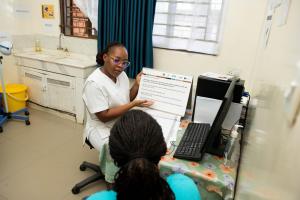Providing nonjudgmental and empathetic sexual and reproductive health services in Zambia
Lusaka – To improve access to sexual and reproductive health and rights (SRHR) services, including family planning and safe abortions, Zambia is training health workers in values clarification and attitude transformation (VCAT).
Adolescents and young people often face barriers when seeking family planning services or safe abortions at health facilities. These barriers can be rooted in stigma and discrimination, which foster disapproval and negative perceptions against people seeking or providing these services.
VCAT is a process that helps health workers understand their core values and how those influence their decisions and behaviours. It involves examining one's own beliefs, attitudes and assumptions and using that understanding to make more informed choices and take meaningful action. This process can lead to personal growth, improved decision-making and positive change.
“In Zambia, deeply rooted cultural, religious and societal beliefs influence people's views on SRHR, particularly on topics like abortion, contraception, adolescent sexuality and access to services,” says Dr Samson Chisele, Obstetrician-Gynaecologist at Lusaka’s University Teaching Hospital and sexual and reproductive health and rights advocate.
These values, attitudes and perceptions can also be held by community health assistants, who provide vital health information and deliver primary health services to communities.
To better equip these frontline health providers, the Ministry of Health, with technical and financial support from World Health Organization (WHO) and partners, organized a four-day VCAT training in March 2025. This initiative brought together 30 participants, including community health assistants and provincial community health focal people from the 10 provinces in Zambia.
The primary goal of the training was to address personal biases that act as barriers to essential SRHR services, particularly safe abortion and family planning, including contraception.
“During one session, we found that while most community health assistants were comfortable providing contraceptives to married people, they were reluctant to do so for adolescents,” says Dr Chisele, who led the facilitation of the workshop. “VCAT helped them separate personal beliefs from their professional duties, aligning their work with government policy.”
The comprehensive training programme provided accurate legal and medical information, addressed stigma and showcased personal stories that humanize young people’s experiences. It emphasized the principles of providing non-judgmental and empathetic care to adolescent girls and young women.
Around 760 women in Zambia died during pregnancy or childbirth in 2024, according to the Ministry of Health’s Maternal and Perinatal Data Surveillance and Response (MPDSR) system. An estimated 5.1% of these deaths are attributed to unsafe abortion. This is despite provisions in Zambia’s 1972 Termination of Pregnancy Act: if the physical or mental health of the pregnant woman is at risk, or the health of the foetus is at risk, or under certain socio-economic conditions, abortion is permitted by law.
Participants learned how to deliver safe, effective and client-centred abortion care, including comprehensive counselling and appropriate referrals, ultimately encouraging health clients to seek care without fear of misconceptions or stigma.
The basic elements of abortion-related counselling encompass pregnancy options, procedure options and ensuring the client's ability to make voluntary, informed choice and provide consent after receiving this information.
“My facility has two functioning youth-friendly corners which have helped the community and adolescents to access information, such as family planning methods available, who to get if from and where to find it,” says Hamatanga Gwangai, a health worker from Mululu rural health post in Chibombo, a town in the Central Province of Zambia. “We faced some resistance from parents but after sharing some experiences they agreed to allow their children to access these services.”
A key component of the training involved encouraging health workers to reflect on their personal values and societal norms, fostering a deeper understanding of how these can impact care for health clients.
“VCAT has helped,” says Helen Mwape, a community health assistant from James Milambo Memorial Health Post in Lufwanyama District, in the country’s central Copperbelt Province. “I received one adolescent for family planning and after asking where she got the information, she pointed one of the community-based volunteers... so it's working.”
Following the training, participants’ primary role is to act as change agents within their communities, orient fellow health workers at their respective facilities and lead open discussions on family planning and abortion. Community health focal people from the Ministry of Health are expected to orient community health assistants in VCAT during their supervisory visits in their assigned provinces.
“Following my action plan, I have taken several steps,” says Danny Kasongo from Misenga rural health post in Mansa district of Luapula province, located in the northern part of the country. “I have oriented fellow staff on VCAT, conducted meetings with stakeholders, including the community, engaged community-based volunteers and created an adolescent safe space where sexual and reproductive health issues are discussed and services available.”
VCAT represents a cultural shift within Zambia's health system. “WHO is proud to support this initiative,” says Dr Clement Peter Lasuba, WHO Representative in Zambia. “By targeting the root of stigma and empowering health providers, this programme is helping to ensure that no one is turned away or shamed when they seek care.”
According to Dr Chisele, VCAT needs to be integrated into health and education systems: nursing and medical schools, teacher training colleges and public service induction programmes. “We also need localized, co-created modules with local leaders and marginalized groups to ensure relevance. Digitizing and modernizing VCAT delivery could attract younger audiences and tech-savvy healthcare workers. In this way we ensure sustainability and longevity to truly transform service delivery,” he says.



